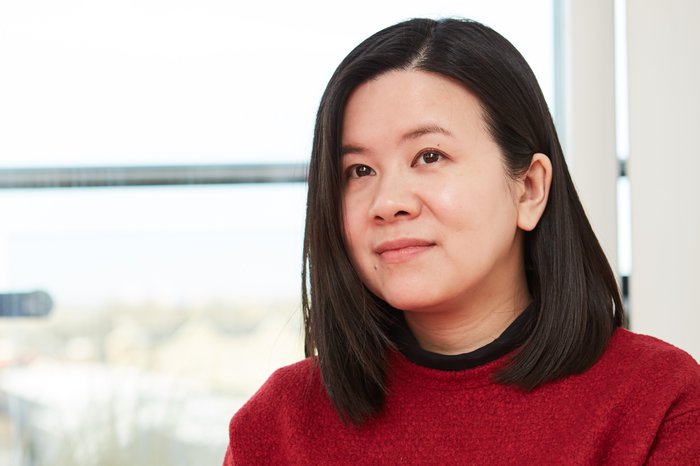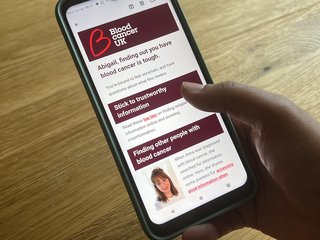When blood cancer needs urgent treatment
When Jacqueline was diagnosed with a fast-growing type of non-Hodgkin lymphoma, she had little time to process what was happening.

Jacqueline, diagnosed with diffuse large b-cell lymphoma
Jacqueline and others worked with us to create a booklet of key information for anyone who's just been diagnosed with blood cancer, Your blood cancer diagnosis: What happens now? Order free copies for yourself, your family and friends.
I was up a mountain on holiday when I noticed that I couldn’t breathe. I thought it was the altitude. But I didn’t feel any better once I’d come back down – I still felt like I was wearing an astronaut’s helmet. I thought it must be an infection.
Back home, I was in a meeting at work when I started to laugh and couldn’t get my breath back. A colleague advised me to call 111, and I was told to go to the nearest hospital. Tests showed it was something to do with my blood and I was transferred to the haematology unit at another hospital. I stayed in for two weeks while they tried to find out what was wrong.
At first, I was convinced they were making a mistake. I just couldn’t believe it was anything major.
The diagnosis was a type of non-Hodgkin lymphoma called diffuse large B-cell lymphoma. At the time, I didn’t know what that was. My initial reaction was, “It’s the wrong diagnosis!” The idea just didn’t sink in. Then when my husband came to visit and I saw him cry for the first time ever, I realised it could be something serious.
I had a lump in my neck that was pressing on my main artery. I was told the treatment would be chemotherapy and radiotherapy and given a choice of starting in one week or ten days. I chose ten days, so I’d have a bit more time to prepare.
How to cope with an acute blood cancer diagnosis
There’s no easy answer to this because things happen so fast. But in the ten days I had between my diagnosis and starting treatment I made a list of practical things to do. I told my HR department about my diagnosis and treatment plan so I could go on sick leave. I cut my hair because I knew it was likely to be affected by the chemo. I looked into whether changes to my diet could help. I typically drink a lot of herbal teas and use traditional Chinese medicine, so I did some research to check whether I was doing anything that would interfere with the chemo.
If you have time and energy before you start your treatment, it’s good to get tips from online support groups like the Blood Cancer UK online community forum. Of course only your treatment team can give you medical advice, but people on the forums can tell you what they’ve learnt from experience – things no one else would think of. Small things that can help you feel more in control.
Here’s my tip: wear a zip or button-up top to your chemo sessions. If your arm gets sore from the IV it’s better to avoid putting clothes on over your head.
The emotional impact of a blood cancer diagnosis
While I was in hospital for tests, all I thought about was going home. Once I’d got home, it did start to hit me that I had a cancer diagnosis. But when you have a blood cancer that needs treatment straight away, you don’t have time to process what’s happening.
It was such an emergency, I never stopped to ask, why me? I thought, if I start crying or panicking, it’s not going to help. And it would make my family feel worse. I wanted to save my energy for getting better.
So throughout my treatment, I focused on my physical health. It was only later, after treatment, that I found I needed emotional support. I was lucky enough to join a course for cancer patients and found it helpful to talk to others with similar experiences.
I didn’t consider getting support for my mental health until after my treatment, but everyone is different. I think it’s helpful to know you can ask for psychological support when you need it, whenever that may be. When you’re ready, Blood Cancer UK has information about self-help strategies and professional support for your mental health.
The Blood Cancer UK online community forum is a safe place to explore your feelings about a blood cancer diagnosis. There’s no need to share anything if you don’t want to, but you’re bound to read something helpful from others who’ve been through something similar. Family members are also welcome to use the forum and our other support services.

Get a weekly support email from us
We'll send you clear and simple information, practical tips, and advice from other people with blood cancer, to help during the first few weeks and months after diagnosis.
